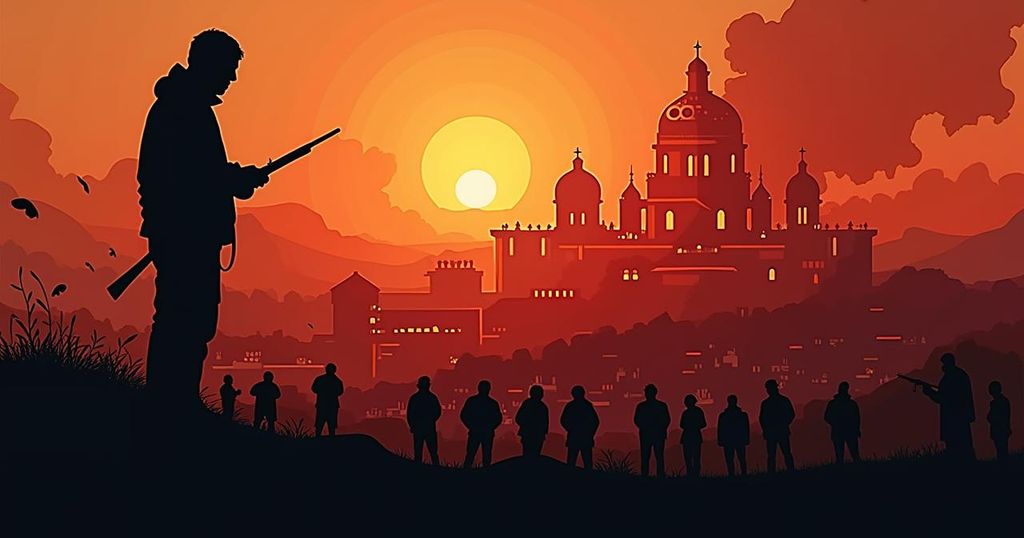Armenia’s ‘Velvet Revolution’: A Journey from Hope to Despair in the Wake of War
The aftermath of Armenia’s defeat in Nagorno-Karabakh has devastated the nation, resulting in the loss of over 2,300 lives and diminished support for Prime Minister Nikol Pashinyan. Once a symbol of hope following the “Velvet Revolution,” Pashinyan faces criticism and calls for resignation as the public prioritizes immediate challenges over previous democratic reforms. With a looming economic crisis and increasing disillusionment, Armenia’s future remains uncertain as the effects of conflict linger.
Armenia’s recent military defeat in Nagorno-Karabakh against Azerbaijan has had a profound impact on the nation, resulting in the loss of at least 2,300 lives and a significant decline in support for Prime Minister Nikol Pashinyan’s reformist government. In Yerevan, in the aftermath of this conflict, the streets are filled with soldiers and refugees who symbolize the heavy toll and emotional destruction faced by Armenia. The initial burst of optimism that followed the “Velvet Revolution” in 2018, which saw Pashinyan rise to power amid widespread calls for reform and an end to corruption, has vanished. The dreams of a new era were smashed by the recent 45-day conflict marked by violence and grief, leading to a dramatic shift in public sentiment. Armenia now grapples with a devastating defeat that has brought an influx of around 100,000 refugees and left the healthcare system overwhelmed by a COVID-19 surge. This turmoil has caused many Armenians to prioritize the immediate crisis over previous reforms. Statements from influential figures—including Jonathan Lacôte, the French ambassador to Armenia—undermine the pre-war confidence, positing that the country has reached a catastrophic level. Once hailed as a hero, Pashinyan is now labeled a traitor by segments of the population after signing a ceasefire agreement, which many view as a capitulation. As public outcry against Pashinyan’s government intensifies, calls for his resignation grow louder, fueled by opposition groups calling for retribution against the administration. Despite these challenges, the opposition’s capacity for mobilization appears weak, generating sparse turnout at demonstrations, which now pale in comparison to the magnitude of the protests during the revolution. Amidst the chaos, the economic horizon looks bleak, with a looming crisis exacerbated by high poverty rates and the influx of refugees into an already struggling system. Experts warn that the negative trends will challenge Pashinyan’s leadership, with the potential for significant emigration looming as a distressing possibility. As the nation grapples with the ramifications of the military loss and the stark return of disillusionment, many Armenians reflect on their hopes dashed by the conflict, with remnants of historical injustices resurfacing in the minds of the populace. The dream of a prospering, democratic Armenia feels increasingly unattainable, against the backdrop of a profound societal crisis.
The backdrop to Armenia’s situation is rooted in the conflict over Nagorno-Karabakh, a region long claimed by both Armenia and Azerbaijan. The historical tensions were temporarily set aside leading to the “Velvet Revolution” in 2018 that sparked hope for democratic reforms and improved governance under Prime Minister Nikol Pashinyan. However, the combat resurgence culminating in a ceasefire agreement in late 2020 has led to significant losses and transformed the public’s perception of Pashinyan, who once rallied support for change. With ongoing economic instability and a public that is losing faith in leadership, the situation poses challenges for recovery and reinvestment in reform efforts.
In conclusion, Armenia’s struggle in the wake of its military defeat represents a profound crisis for the nation. The initial hopes brought forth by the “Velvet Revolution” have given way to disenchantment and turmoil as the population grapples with loss, economic instability, and political uncertainty. The current landscape calls for a reevaluation of leadership and direction if Armenia hopes to navigate its way back to a state of hope and possibility.
Original Source: worldcrunch.com




Post Comment